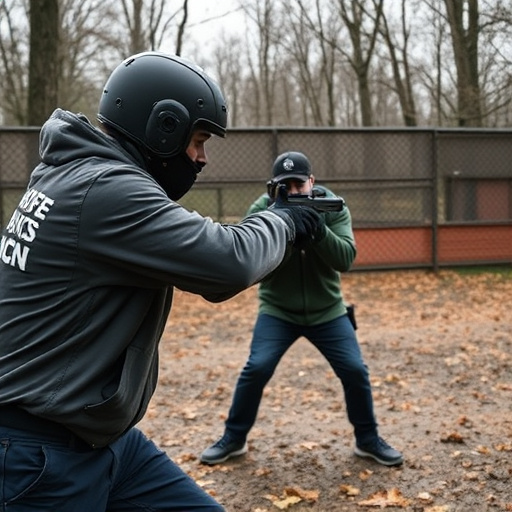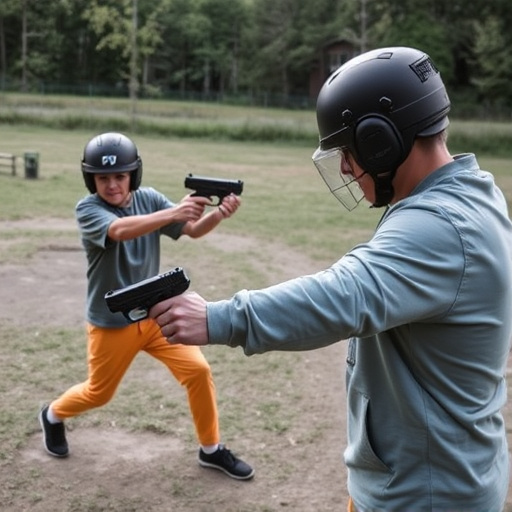Civilian Taser Ownership: State Laws for Compact Stun Guns Carry
State laws in the US significantly vary regarding the ownership and carrying of compact stun guns fo…….
State laws in the US significantly vary regarding the ownership and carrying of compact stun guns for personal protection, especially when intended for purse carry. Potential owners must familiarize themselves with their state's specific regulations covering permit requirements, age restrictions, usage guidelines, and size limitations for these devices to ensure legal compliance and safe use.
“Uncovering the legal landscape of civilian taser ownership is crucial for those interested in personal protection. This article navigates the diverse state laws regarding compact stun guns, specifically focusing on purse carry regulations. Understanding these requirements is essential for citizens aiming to exercise their right to self-defense while adhering to local legislation. From comprehensive background checks to specific permit types, each state has unique rules shaping the accessibility of compact stun guns. Dive into this guide to explore key factors and gain insights into navigating your state’s taser ownership regulations.”
- Understanding State Regulations on Civilian Taser Ownership
- Legal Requirements for Carrying Compact Stun Guns in Public
- Key Factors and Variations in Taser Laws Across Different States
Understanding State Regulations on Civilian Taser Ownership

In the United States, the regulations surrounding civilian Taser ownership vary significantly from state to state. Understanding these state laws is crucial for anyone considering carrying a compact stun gun for personal protection. Each state has its own set of requirements and restrictions, ranging from permit systems to age limitations and specific prohibitions on where and how these devices can be used or carried.
For instance, some states allow unrestricted ownership of Tasers, while others mandate that users obtain a special permit or license. Certain regulations also dictate the type and size of stun guns permitted for personal carry, with many states favoring compact models designed to fit easily in purses or pockets. Additionally, state laws often outline rules regarding activation and use, ensuring public safety by preventing misuse. Understanding these regulations is essential to ensure compliance and promote responsible Taser ownership.
Legal Requirements for Carrying Compact Stun Guns in Public

In many states across the US, civilians are allowed to carry compact stun guns in public, provided they meet certain legal requirements. This practice, often facilitated by state laws that permit purse carry or concealed carry of non-firearm self-defense devices, has gained popularity among individuals seeking personal safety. However, understanding and adhering to these legal requirements is paramount.
Each state has its own set of guidelines regarding who can carry a stun gun, where it can be carried, and the specific type of device that is permitted. For instance, some states only allow licensed individuals or those with a permit to carry stun guns in public, while others have less stringent requirements. Compact stun guns designed for purse carry must meet size restrictions and often need to be easily detectable when carried. It’s crucial for prospective owners to research and understand their state’s specific regulations to ensure compliance and avoid any legal repercussions.
Key Factors and Variations in Taser Laws Across Different States

In the United States, laws regarding civilian taser ownership vary significantly from state to state, with each jurisdiction having its own set of regulations and requirements. When it comes to compact stun guns for purse carry, understanding these variations is crucial. Several key factors influence the legal landscape: the type of weapon permitted, restrictions on carrying capacity, age restrictions, and specific conditions under which a taser can be used.
Some states allow unrestricted ownership of tasers, while others mandate permits or licenses. Certain jurisdictions also differentiate between stun guns and tasers, with varying levels of regulation based on power output or voltage. For instance, some states may permit low-voltage stun devices for personal protection but restrict higher-powered models. Additionally, laws often address where and how these weapons can be carried, with regulations around concealed carry permits and specific requirements for open carry. Understanding these nuances is essential for civilians considering the legal acquisition and use of compact stun guns designed for purse carry.
In conclusion, understanding the varying state laws regarding civilian Taser ownership is crucial for those interested in carrying compact stun guns for personal protection. While some states allow purse carry with minimal requirements, others have stricter regulations. Navigating these laws ensures responsible and legal self-defense options, empowering folks to make informed decisions based on their region’s specific guidelines.


